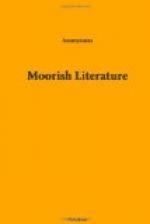It is another style of writing, less seductive, perhaps, than that of the Moorish romances, in spite of their lack of vivacity and their bad taste. But why mark this as the expression of the Mussulman sentiment under Christian domination? Conquered by the Castilians, the Aragons, and the Portuguese, the Moors had lost the use of Arabic, but they had preserved the exterior sign-writing, just as their new converts retained their usages and their national costumes. We possess a complete literature composed in Spanish, but written in Arabic characters. They called it by the name of Aljaniado. Its chief characteristic is that it treats of the principal legends of the Mussulmans; those of Solomon and Moses, of Jesus; the birth, childhood, and the marriage of Mohammed; Temins ed Daria, the war of the king El Mohallal, the miracle of the moon, the ascension of Mohammed to heaven, the conversion of Omar, the battle of Yarmouk, the golden castle, the marvels that God showed to Abraham, Ali and the forty young girls, the anti-Christ and the day of judgment[1] etc.; the legend of Joseph, son of Jacob; that of Alexander the Great,[2] to which could be added the story of the princess Zoraida,[3] without speaking of the pious exhortations, magic formulas, conjurations, and charms.[4]
[1] Guillon Robles. Legendas Moriscas. Madrid, 1885-86. 36 petit in 8vo.
[2] Guillon Robles. La Legenda de Jose, hijo de Jacob, ye do Alexandro Magna. Zaragoza, 1888, en 8vo.
[3] L de Eguilas el Hditz, de La Princess Zoraida. Granada, 1892, 16mo.
[4] P. Gil y Ribera et Mar Sanches. Colleccion el textos Aljamiados. Zaragoza, 1888, 8vo.
The Moors held to these documents all the more that they were written in Arabic, and that the fury of the Inquisition was let loose upon them. To save them from the flames, their owners hid them with the greatest care, and but recently, at El Monacid, they found a whole library in Arabic and Aljamiado, hidden more than two centuries between the double walls of an old house.[5] The Mussulman proprietor of these books and his descendants were dead, or had emigrated to Africa, abandoning the treasure which was to see the light in a more tolerant epoch.
[5] Pamo. Las coplas del Peregrino de Puey Moncon. Zaragoza, 1897. Pet. en 8vo.
Political relations also existed between those of the Moors who remained in Spain as converts and such as had fled from persecution and carried to the populations of the north of Africa the hatred of the Spanish Christians. Thus we find among the popular literature of the Magreb the same legends, but edited in Arabic. Only a small number has been published.[6] Whether in one language or the other, editing does not offer anything remarkable. The stories have been developed, after the traditions of the Mussulmans, by the demi-litterateurs, and by that means they have become easier and more accessible to the multitude.




